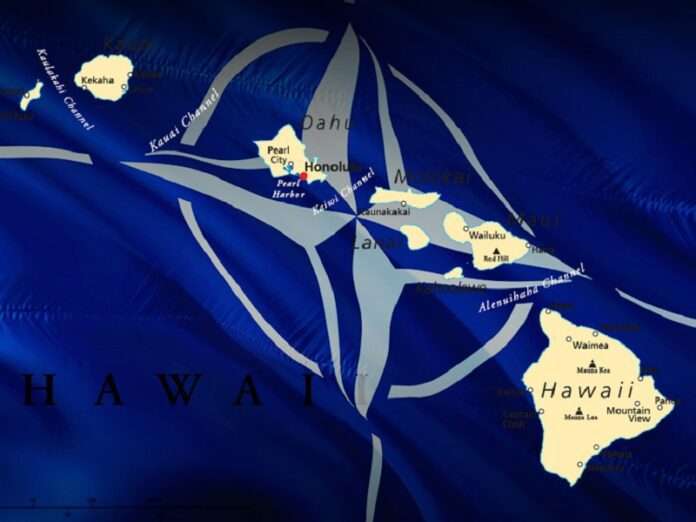CNN published a piece on Saturday titled “This US state is not covered by the NATO treaty. Some experts say that needs to change”, which raises awareness of the fact that Hawaii isn’t covered by NATO’s Article 5 since it isn’t located within the continental US that reaches the North Atlantic like the other 49 states. This is unlikely to be rectified since a State Department spokesperson said that other NATO members also have territories located beyond that body of water and would want them to be part of Article 5 too.
The US didn’t support the UK during its 1982 war with Argentina over the Falkland/Malvinas Islands in the South Atlantic, however, so there might be some lingering resentment in London over this issue. France also has geographically extensive territories in the South Pacific that aren’t covered by NATO either, but the US also might not feel comfortable legally obligating itself to defend them. About that, Article 5 doesn’t mandate the dispatch of troops, but just whatever each member deems necessary.
Nevertheless, the popular perception is that any member that requests support through these means will receive the most realistic level thereof possible, which is why the average person might imagine that Hawaii’s geographic exclusion from Article 5 could therefore lead to less assistance. Two experts from the partially US Government-funded Pacific Forum think tank are cited in CNN’s report fearmongering that its exclusion and Guam’s removes “an element of deterrence” and “emboldens” foes.
The obvious innuendo is that China might consider a Pearl Harbor-like first strike, the scenario of which is alluded to right at the start of their article without mentioning that country, against one or both on the alleged basis that it wouldn’t have to fight all of NATO afterwards. To CNN’s credit, they ended their article by citing a European expert’s evaluation that contradicted those other two experts’ by predicting that a “coalition of the willing” would be assembled in support of America should that happen.
Even so, average readers might not make it to the end of the article before losing interest upon assuming that they already understood the primary point being conveyed, namely that NATO countries technically wouldn’t be obligated to provide any support to the US if China attacked Hawaii and/or Guam. They might thus be inclined to falsely believe that no support from those countries would be forthcoming in those scenarios, which serves the purpose of stoking anti-Chinese sentiment in society.
Although these two superpowers have been trying to more responsibly manage their systemic competition since the Xi-Biden Summit in November, it’s clear that the US is planning to “Pivot (back) to Asia” after the end of the Ukrainian Conflict, ergo why its helping to build “Fortress Europe” right now. This German-led concept will see Berlin lead the continent’s containment of Russia after comprehensively subordinating Poland, though France might also play a key role too.
In any case, the point is that the US is already preconditioning the public to expect an exacerbation of the Sino-US dimension of the New Cold War once the Russo-US one calms down, thus explaining why “The US Is Testing China’s Patience By Deploying Special Forces Just Six Miles From The Mainland”. That move was revealed last month by the Taiwanese “Defense Minister”, though China chose not to bite the bait by reacting to it in a way that could have fueled the US’ fearmongering campaign.
It’s within this context and the larger one of America assembling a NATO-like Asian military alliance via AUKUS+, particularly via Japan and the Philippines, that CNN’s latest article should be analyzed. That outlet is creating a fake controversy over Hawaii not being covered by NATO’s Article 5 in order to revive anti-Chinese sentiment across American society through the innuendo that this state of affairs supposedly “emboldens” China to attack that state and also Guam.
In other words, it’s part of the US’ plans to prepare the public for its “Pivot (back) to Asia” after the Ukrainian Conflict ends, during which time those thousands of troops that were deployed to Europe over the past two years to contain Russia there will gradually redeploy to Asia to contain China instead. Since this legal technicality excluding Hawaii and Guam from NATO’s Article 5 probably won’t be resolved for the previously mentioned reasons, the public might therefore support this move on that basis.
It doesn’t matter that no NATO member has anywhere near the military capabilities that the US does so their support in any hot war between those superpowers won’t make any difference since the average America can easily be scared into thinking that this state of affairs removes “an element of deterrence”. Therein lies the true purpose of CNN’s latest article in preconditioning the public for an impending, but not necessarily imminent, exacerbation of the Sino-US dimension of the New Cold War.







